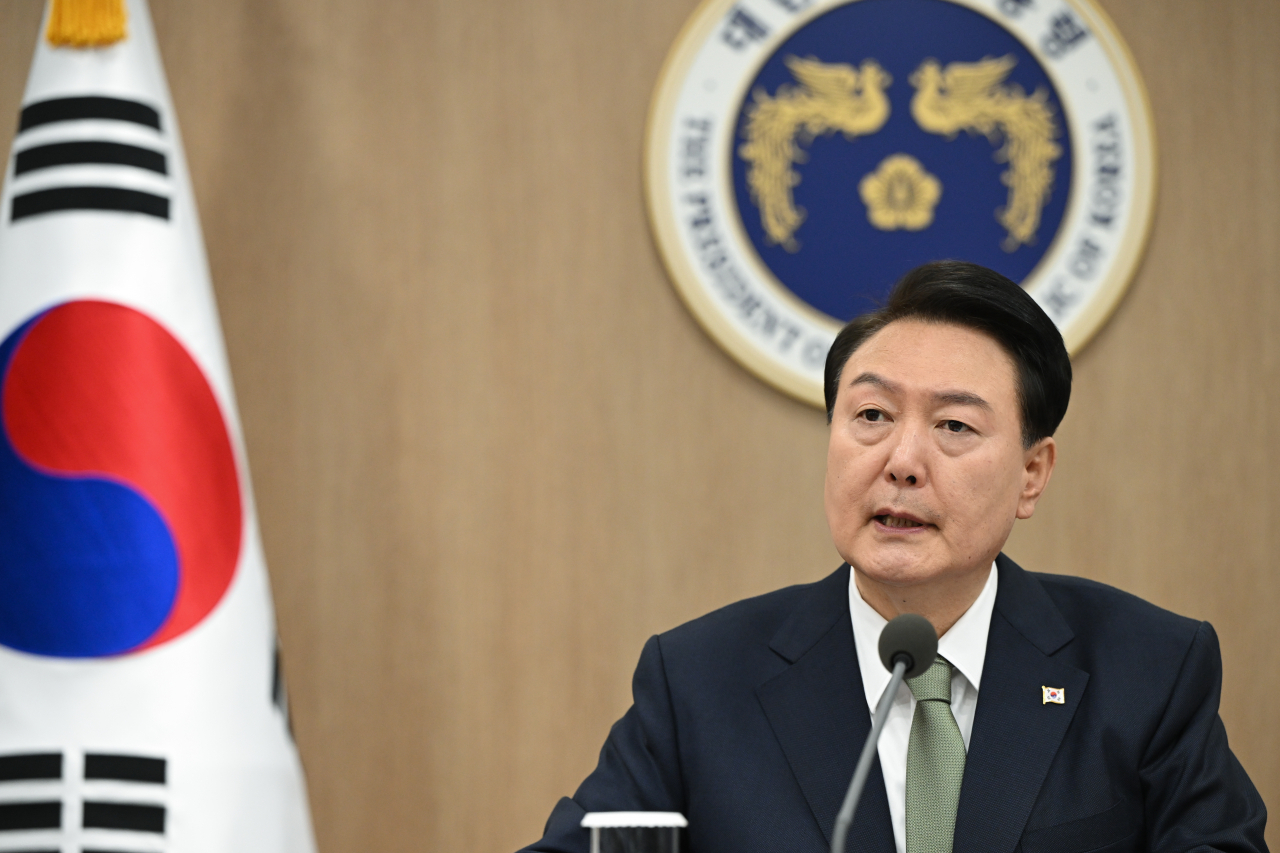 |
President Yoon Suk Yeol during the weekly Cabinet meeting at the presidential office in Seoul on Monday. (Yoon’s office) |
President Yook Suk Yeol on Monday instructed his ministers to do everything possible to hold responsible those who allegedly scammed young Koreans seeking home rentals, and pledged to have the government’s pension reform proposal reach a “social consensus,” without offering further details.
“The majority of (those affected by) this ‘jeonse’ scam are young Koreans. This is an egregious crime that hurts our next generation,” Yoon said at the weekly Cabinet meeting. Under the traditional jeonse system, tenants pay a lump sum up front instead of monthly rent, and landlords use it to invest, though they have to return the exact amount at the end of the lease term.
Some 671 households are believed to have been scammed in a recent rental scheme, potentially amounting to at least 80 billion won ($59 million) in deposits that the tenants, mostly in their 20s and 30s, are demanding back. A second round of questioning took place Monday as police grilled three suspects, all from one family.
Yoon also doubled down on sticking to a pension reform plan unveiled last week by Health Minister Cho Kyoo-hong, vowing to do his best to seek unity on the issue. Yoon did not touch on what exactly the country should do to avoid depleting the pension pool by 2055, a government estimate prompted by an aging population.
“Rather than the government pointing to specific numbers ... we feel a public discourse should take place to really debate (the issues at hand),” Cho told reporters last week, noting that Koreans would have to gradually pay more for pension.
The health minister unveiled the reform measures without offering figures on how much more Koreans should pay and when such changes should kick in. Details about the pension that Koreans would receive upon retiring and whether it would provide enough for a “decent living” were omitted as well, fueling criticism that the Yoon government lacks initiative.
“Simply sticking to numbers decided by the government won't solve this problem,” Yoon said, adding, “We have come up with data -- a pool compiled very scientifically as officials held meetings with top pension experts, conducted interviews and ran a poll on the general population.”
But lawmakers, who will now look over the plan the Health Ministry has drawn up, are not expected to come up with a breakthrough anytime soon. With elections coming up early next year, lawmakers are unlikely to discuss what they as doing little to attract votes.
Meanwhile, the Korean leader touted his state visits to Saudi Arabia and Qatar last week -- a six-day tour to the Middle East that he said is worth 27 trillion won, given the memorandums of understanding on investment signed with the two countries.
“A level playing field in the Middle East that is worth 107 trillion won for Korean companies” is what Asia’s fourth-largest economy is looking at, Yoon added, referring to all the memorandums reached so far, including those with the United Arab Emirates last year. The Yoon administration is stepping up efforts to tap into new markets beyond Asia.
But uncertainties are growing in the Middle East as Israel begins its ground invasion of the Gaza Strip, an operation Israeli Prime Minister Benjamin Netanyahu says will be “long and difficult.”
In a phone call Monday with counterparts in Israel, the UAE and Jordan, Foreign Minister Park Jin reiterated that international cooperation should remain steadfast to avoid civilian casualties in accordance with international humanitarian law.







![[Today’s K-pop] Blackpink’s Jennie, Lisa invited to Coachella as solo acts](http://res.heraldm.com/phpwas/restmb_idxmake.php?idx=644&simg=/content/image/2024/11/21/20241121050099_0.jpg)